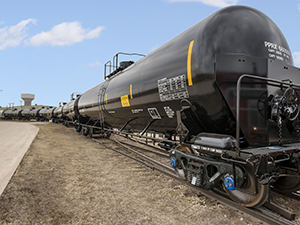Update: Council sends letter urging safety measures for oil train
Update posted April 15
Council sends letter to Office of Information and Regulatory Affairs
At the close of the April 7 Paso Robles City Council Meeting, the council decided to pen a letter voicing concerns and urging safety measures be taken regarding the proposed oil train spur.
Phillips 66 is proposing bringing a total of 5 more trains per week through many cities in California including Paso Robles, and the trains have a reputation for being dangerous and volatile.
But because cities don’t have the jurisdiction to regulate what things are transported via rail, the council decided to draft a letter and send it to all of the appropriate parties that suggested safety measures for the new trains. The complete letter, addressed to Mabel Echols at the Office of Information and Regulatory Affairs, is below:
RE: Rail Safety- Expedited Action Requested
Dear Ms. Echols:
Due to a steady flow of concerns about the transport of crude oil by rail voiced by our citizens for several months, the City of El Paso de Robles has been in contact with the League of California Cities, which has been monitoring transport of crude oil and other hazardous materials by rail, as well as hosting educational forums on the topic. We note that the League has recently adopted as its policy several goals for safety improvements based on input from our key state agencies. The City of El Paso de Robles agrees with the League’s position that implementation of these rail safety improvements should be expedited at the federal level to accomplish improved rail safety as soon as possible.
The continued increase in the transport of crude oil by rail, combined with recent rail accidents involving oil spills and resulting fires, has served to heighten concerns about rail safety among many of our citizens. Specifically, two derailments accompanied by fires involving unit trains (100 or more tank cars) carrying crude oil in West Virginia and in Ontario, Canada last month have greatly increased public anxiety about what steps the relevant federal regulatory agencies are taking to improve rail safety, and on what timetable.
The Board of Directors of the League of California Cities at its February 20, 2015 meeting adopted ten specific recommendations as official policy on this issue. The City of El Paso de Robles respectfully submits these recommendations to you as priority items for improving rail safety. We have three points to emphasize in submitting these recommendations. First, irrespective of whether these improvements are required of railroads, petrochemical companies, hazardous materials shippers, or the owners or lessees of rail tank cars, we urge that they take the form of mandates, rather than the more traditional recommendations. Second, the mandates should be accompanied by the imposition of a hard deadline for their implementation. Third, we strongly recommend that the Office of Budget and Management include these recommendations for improved rail safety in the final rule for the Safe Transportation of Crude Oil and Flammable Materials.
The City of El Paso de Robles urges the federal agencies with appropriate jurisdiction (primarily the National Transportation Safety Board, the Federal Railroad Administration, and the Pipeline and Hazardous Materials Safety Administration) to take the following actions to improve rail safety with respect to the transport of Bakken crude oil and other hazardous materials by rail:
1) Mandate Electronically Controlled Braking Systems: Require installation of electronically controlled, pneumatic braking systems (ECP) on trains carrying Bakken crude and ethanol by a date certain. This technology allows for faster and more efficient braking to a full stop.
2) Expedite retrofit or phase-out of tank cars failing to meet current safety standards: Require phase-out or retrofitting of older, DOT -111 tank cars manufactured prior to October 2011, to be completed by a date certain. The Association of American Railroads adopted higher manufacturing standards requiring greater structural integrity for these tank cars which took effect at that
time to facilitate safer transport of flammable liquids, including ethanol and all crude oil. The El Paso de Robles City Council strongly urges the immediate phase-out of the DOT-111 tank car.
3) Mandate Provision of Real-Time Information to first responders in event of accidents: Require via federal regulations that railroads and producers of petroleum and other hazardous materials shipped by rail make available to first responders, via a secure access portal on their websites, the cargo manifest information, or “consist,” on trains containing these substances. This information
ideally should also be accessible via mobile applications, allowing rapid access by first responders to cargo manifest information in real time, particularly in accidents where the manifest is not available on the train. The El Paso de Robles City Council would emphasize that the cargo manifest information needs to be immediately available to the El Paso de Robles Fire Department in case of a rail accident.
4) Federal funding for first responders: Increase federal funding for training and equipment purchases for first responders, to improve their ability to respond to hazardous materials accidents. This training and reimbursement for equipment and supplies to the El Paso de Robles Fire Department is of utmost importance.
5) Mandatory Speed Limits: Impose mandatory maximum speed limits in all areas.
6) Mandate Stricter Reporting Requirements: Lower the threshold for the number of tank cars that trigger a reporting requirement to the California Energy Commission and the State Emergency Response Commission, from 33 to 20. Currently petroleum producers and railroads only have to submit reports of trains carrying Bakken crude oil if the train includes 33 or more tank cars. Each tank car holds 34, 500 gallons. This will lower the trigger for the reporting requirement from shipments of 1.1 million gallons or more, to shipment of 690,000 gallons or more.
7) Identity priority routes for positive train control (PTC): PTC is an advanced technology incorporating GPS tracking to automatically stop or slow trains before an accident can occur. It is specifically designed to prevent train-on-train collisions, derailments due to excessive speed, and unauthorized movement of trains. Require PTC to be employed on all rail lines used for the transport of hazardous materials, with a date certain by which the technology will be online.
8) Mandate railroad industry compliance with Individual Voluntary Agreement negotiated with the U.S. Department of Transportation by codifying the following actions as requirements: (Note: The requirements below have been voluntarily agreed to by railroads, but there is currently no legal or regulatory requirement for their compliance. Such requirements should be codified, given their significant impact on rail safety)
• Reduced speed for crude oil trains with older tank cars going through urban areas
• Analyses to determine the safest routes for crude oil trains
• Increased track inspections
• Enhanced braking systems (electronically controlled pneumatic brakes) ECP
• Installation of wayside defective bearing detectors along tracks
• Better emergency response plans
• Improved emergency response training
• Working with communities through which oil trains must move to address community concerns
9) Clear methodology for funding: Devise a clear methodology on how funds are to be distributed, to ensure that sufficient funds pass through that state and county agencies to the local agencies involved in first response.
10) Regulate the parking and storage of tank cars: Mandate improved safety regulations addressing the storage or parking of tank cars in populated areas.
11) Consider Impacts on Local Communities: Historic Downtown El Paso de Robles is bisected by the Union Pacific Railroad with five at grade crossings. Increased shipment of lengthy oil trains through El Paso de Robles will negatively impact local traffic circulation, increase emergency service response times, impair passenger rail service, and degrade tourism experience within Downtown. The City of El Paso de Robles understands that this area of regulation is largely preempted by federal law; that is why we are urging specific and timely action by the federal agencies charged with regulatory oversight in this area. We do not expect that derailments and accidents will cease altogether, but we anticipate that stricter safety standards will reduce their numbers over time. Thank you for your attention to this matter. Please contact me or my City Manager, Jim App at (805) 237-3888 with any questions.
Sincerely,
Steve W. Martin
Mayor
Original story posted April 9
Council to send letter to appropriate parties
At the April 7 Paso Robles City Council meeting, the council discussed additional information presented regarding the potential implications of expanding crude oil transport via the Union Pacific railroad.
The report received on Tuesday night was a follow up from a report given by Fred Strong on March 3.
Phillips 66 is currently working with San Luis Obispo County and other government agencies to obtain permits to extend the existing rail spur within the refinery property. They are proposing that an additional 5 oil trains per week pass through the city. The trains are approximately 1.5 miles long, and would travel at an average rate of 40 mph.
The Santa Maria Refinery Rail Project website stated that the reason they want to build the spur is because, “Changes in the California oil industry are affecting the way the Phillips 66 Santa Maria Refinery does business. The Santa Maria Refinery currently processes crude oil that arrives via underground pipe from locations throughout California. With the decline in California crude oil production, Phillips 66 is looking for alternate sources outside the state for reliable supplies of competitively priced crude oil that can be processed at the refinery. However, there are no pipelines that connect the refinery to these alternate sources of crude oil and the refinery does not have a marine offloading facility. The solution is to utilize and enhance our existing rail facility to enable rail delivery of crude oil.” They have found a new source of crude oil, from Canada, and wish to transport the oil through many California cities to meet demands.
The public voiced concerns about the speed, noise and length of the trains, as well as the emergency response preparedness in the event of a derailment or explosion.
The Paso Robles Fire Department determined that additional training would be required, and additional fire fighting foam would be needed.
The California League of Cities proposed a letter template for use by the council that would the project to adhere to safety demands.
Citizens spoke out in protest of the spur, as well as in support. The council pointed out that city governments, however, don’t have the power to stop the spur; it would be a federal decision. Some citizens said that the current oppositions, such as letters drafted by other cities like San Luis Obispo, are nothing but “public relation ploys.” Others noted that, although the efforts may be ploys, the concerns are still being heard.
The Mesa Refinery group voiced their opposition to the project, explaining that a chemical dillutant is added to the crude, making it volatile which is why it explodes. If an accident were to occur, much of Paso Robles would be within the explosion zone. Citizens cited a 2013 accident in Quebec as an example of a worst case scenario.
Lisa Stark, director of public affairs for Union Pacific, explained that Union Pacific is whats called a “common carrier,” meaning they have an obligation to transport any material that is given if they follow federal safety regulations. The refinery will not be increasing the amount of oil that it processes, and Phillips 66 has already been transporting crude oil by rail through the city for years, according to Stark.
Citizen Lee Perkins reminded the crowd that the rails are run under federal power. He urged the council to make whatever move they could against the expansion now. “With this expansion, all of our power is lost,” Perkins said. Concerns were also raised that the train would tarnish tourism within the county.
Mayor Steve Martin said that he understood why citizens feel frustrated, saying that if an average person wanted to build, say, a bridge over the tracks, they would have to spend a large sum of money and wait for years just to be denied, but when it comes to a multi-billion dollar business, the public is essentially told, “It’s coming down the tracks, try to get out of the way.”
Maggie Cox, a representative from Barnett Cox and Associates, submitted the following statement from Phillips 66 Santa Maria Refinery Rail Project Manager Jim Anderson for the council’s review:
“In order to maintain continuity of reliable crude sources that have historically only been available by pipeline, Phillips 66 Santa Maria Refinery proposed to extend an existing rail spur that will allow offloading of crude oil that is shipped by rail from outside the local area. Crude oil has been shipped by rail through San Luis Obispo County for more than a decade…Crude will not be received by rail at the Phillips 66 Santa Maria Refinery. In order to maintain the future viability of the refinery, the ability to receive adequate crude oil supplies is vital. This project will have no bearing on the volume of crude oil that comes into California. The amount of crude oil brought into California is based on our demand for gasoline and other refined products.The phillips 66 project only affects whether or not the economic benefits are shared in SLO county through the refinery. If this project does not go forward, the demand for gasoline and diesel remains. Placing restrictions and limitations on any of California’s refiners only impacts that one refinery, it does nothing to impact demand for petroleum products in our state.”
The council unanimously voted to direct a letter to the appropriate federal authorities urging, “enhanced regulation of crude oil transport, improved rail cars, limiting train speeds through towns, thoroughly assessing risks, and requiring enhanced communication with and training of emergency responders, mitigation for traffic impacts, consideration of impacts on the local economy, and other related issues,” according to City Manager Jim App.






















